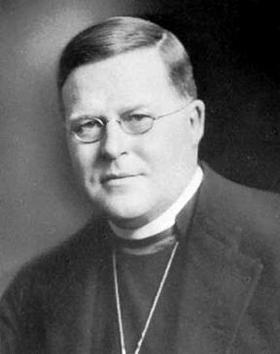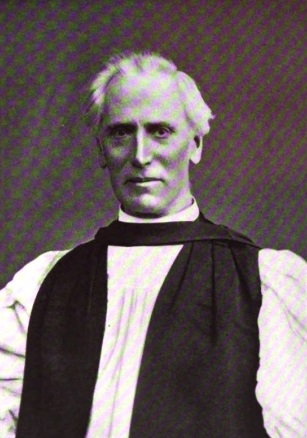
William Temple was an English Anglican priest, who served as Bishop of Manchester (1921–1929), Archbishop of York (1929–1942) and Archbishop of Canterbury (1942–1944).

William Cosmo Gordon Lang, 1st Baron Lang of Lambeth, was a Scottish Anglican prelate who served as Archbishop of York (1908–1928) and Archbishop of Canterbury (1928–1942). His elevation to Archbishop of York, within 18 years of his ordination, was the most rapid in modern Church of England history. As Archbishop of Canterbury during the abdication crisis of 1936, he took a strong moral stance, his comments in a subsequent broadcast being widely condemned as uncharitable towards the departed king.

Ripon College Cuddesdon is a Church of England theological college in Cuddesdon, a village 5.5 miles (8.9 km) outside Oxford, England. The College trains men and women for ministry in the Church of England: stipendiary, non-stipendiary, local ordained and lay ministry, through a wide range of flexible full-time and part-time programmes.
George Merrick Long was an Anglican bishop and educationist who served as a brigadier general in the Australian Imperial Force during the First World War. He was also involved in the establishment of Trinity Grammar School in Melbourne, where he became headmaster. He was father of the historian Gavin Long.

Herbert Hensley Henson was an English Anglican bishop, scholar and controversialist. He was Bishop of Hereford from 1918 to 1920 and Bishop of Durham from 1920 to 1939.

Hugh Richard Lawrie Sheppard was an English Anglican priest, Dean of Canterbury and Christian pacifist.

Cosmo Warrior Zero is a science fiction third-person shooter video game released by Taito. It was adapted into an anime television series in 2001.

John Percival was the first headmaster of Clifton College, where he made his reputation as a great educator. In his 17 years at Clifton numbers rose to 680. He accepted the presidency of Trinity College, Oxford, to recover from his years at Clifton. It was from Trinity that he went to Rugby to become headmaster of Rugby School before becoming Bishop of Hereford.
Leslie Hamilton Lang was the fourth Bishop of Woolwich.
Guy Vernon Smith was an Anglican bishop in the mid-20th century.
Henry Aylmer Skelton was a bishop in the mid part of the twentieth century.
Norman MacLeod Lang (1875–1956) was the third Bishop suffragan of Leicester from 1913 until 1927.
Simon Cyril Edgar Stuart was Bishop of Uganda from 1932 to 1952 before returning to England to be Assistant Bishop of Worcester.
Frederic Athelwold Iremonger was an Anglican priest.
The Rt Rev Wilfrid Parker was a Colonial Anglican bishop in the first half of the 20th century. He was born on 23 January 1883 son of the Hon. Cecil Thomas Parker and Rosamond Esther Harriett Longley. His grandfather on his father's side was Thomas Parker, 6th Earl of Macclesfield and his grandfather on his mother's side was Charles Longley, Archbishop of Canterbury. He was educated at St. Andrew's College, Grahamstown, Radley and Christ Church, Oxford. Ordained in 1907, his first post was as an Assistant Priest at the Christ Church Mission, Poplar. From 1909 to 1913 he was Domestic Chaplain to the Archbishop of York. Cosmo Lang was the Archbishop, and he and Parker developed a close friendship through regular newsy letters until the 1940s when Lang died. Lang's Chaplain in 1933 noted that Parker had a 'halo' as far as Lang, the Archbishop of Canterbury, was concerned. In June, 1916, Parker had been interviewed for a commission as a Temporary Chaplain to the Forces. At 6 feet 7 inches, he was exceptionally tall, he could ride and speak French, and was posted to Flanders where he was immediately involved in the Battle of the Somme. He was ill with trench fever from September, was hospitalised in England and was only fit to return to his duties in France early in 1917. He was then posted to Italy where he earned the Croce di Guerra, a bravery award. A report of December, 1918, referred to 'Very exceptional gifts as an Army Chaplain - good report When peace returned he became Vicar of St George's Johannesburg. From 1923 to 1931 he was Priest in Charge of the St Cyprian's Native Mission in the same city then Archdeacon and Director of Native Missions in the Diocese of Pretoria. He became Bishop of Pretoria in 1933 holding the post until his retirement in 1950. A Sub Prelate of the Order of Saint John of Jerusalem, he died on 23 June 1966.

John Marshall Lang was a Church of Scotland minister and author. He served as Moderator of the General Assembly in 1893 and later became Principal of the University of Aberdeen in 1900.

Leeds Clergy School was a theological college of the Church of England which was founded in 1876 and closed in 1925. It was established by the Rev. John Gott, Vicar of Leeds and later Bishop of Truro, with the first principal being E C S Gibson, Lecturer at Leeds Parish Church. The school started with just six students, initially catering for those graduates who were aiming to obtain town curacies. It soon grew rapidly up to a maximum of twenty-four.
Events from the year 1864 in Scotland.
The Reverend Robert Anderson Jardine (1878–1950), who published a memoir as R. Anderson Jardine, was an ordained priest of the Church of England and vicar of a parish in Darlington in the north of England. He is best known for performing the marriage ceremony of the Duke of Windsor and his fiancée Wallis Simpson, who thus became the Duchess of Windsor, in June 1937; this was a marriage that was seen as scandalous at the time. Jardine's offer to carry out the wedding, as a sacrament of a church which opposed it, cost him his career in England.
The Bishop of Leicester was a suffragan bishop of the Church of England Diocese of Peterborough in the Province of Canterbury.








